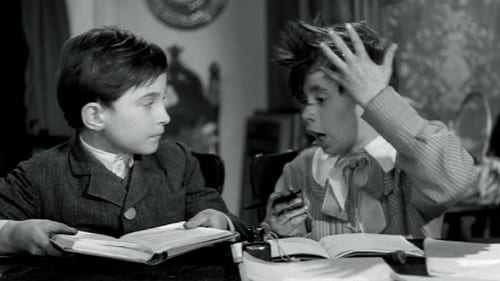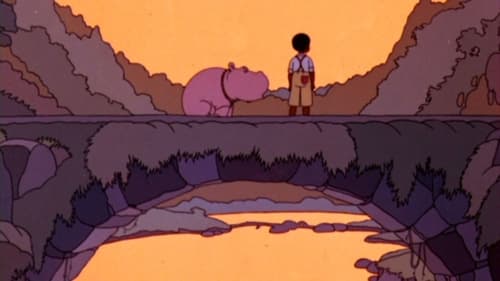The Life and Times of Hank Greenberg (1998)
When America Needed Heroes, A Jewish Slugger Stepped To The Plate.
Género : Documental
Tiempo de ejecución : 1H 30M
Director : Aviva Kempner
Sinopsis
The story of Baseball Hall-of-Famer Hank Greenberg, the first major Jewish baseball star in the Major Leagues, is told through archival film footage and interviews with fans, former teammates, friends, and family. As a great first baseman with the Detroit Tigers, Greenberg endured antisemitism and became a hero and source of inspiration throughout the Jewish community, not incidentally leading the Tigers to Major League dominance in the 1930s.

Michel Negroponte, a documentary filmmaker, meets Maggie one day in Central Park. Maggie claims to be married to the god Jupiter and the daughter of actor Robert Ryan. Michel gets to know Maggie over the next couple of years, and attempts to use her often outlandish stories as clues to reconstruct her past.
- Written by James Meek

Journalists from all over America meet Marlon Brando in a New York hotel room to interview him about his new film, Morituri. Seeing this as an opportunity to let the legendary actor promote the film, they find Brando unwilling to talk about it, instead he is more interested in larking about and turning on the charm when being interviewed by a former winner of the Miss USA competition.

How does art survive in a time of oppression? During the Soviet rule artists who stay true to their vision are executed, sent to mental hospitals or Gulags. Their plight inspires young Igor Savitsky. He pretends to buy state-approved art but instead daringly rescues 40,000 forbidden fellow artist's works and creates a museum in the desert of Uzbekistan, far from the watchful eyes of the KGB. Though a penniless artist himself, he cajoles the cash to pay for the art from the same authorities who are banning it. Savitsky amasses an eclectic mix of Russian Avant-Garde art. But his greatest discovery is an unknown school of artists who settle in Uzbekistan after the Russian revolution of 1917, encountering a unique Islamic culture, as exotic to them as Tahiti was for Gauguin. They develop a startlingly original style, fusing European modernism with centuries-old Eastern traditions.

Nigeria's film industry, Nollywood, is the third-largest in the world--an unstoppable economic and cultural force that has taken the continent by storm and is now bursting beyond the borders of Africa. "Nollywood Babylon" is a feature documentary detailing the industry's phenomenal success. Propelled by a booming 1970s soundtrack of African underground music, the movie presents an electric vision of a modern African metropolis and a revealing look at the powerhouse that is Nigerian cinema.

Artist David Hockney discusses his theory that artists were secretly using optical devices such as mirrors and lenses in creating their work as early as the 15th century.

Filmmaker Jack Bond and Salvador Dali got together at Christmas 1965 to make Dali in New York, a highly entertaining film. Dali devoted two weeks of his life to creating extraordinary scenes for the film, performing "manifestations" with a plaster cast. A thousand ants and one million dollars in cash. When he confronts the feminist writer, Jane Arden, sparks fly. "You are my Slave! I am not your slave. Everybody is my slave." Dali recalls his meeting with Freud, "The last human relationship ever" About his wife, 'But for Gala I would be lying in a gutter somewhere covered with lice" Jim Desmond's dazzling cinematography captures the great artist painting as Flamenco virtuoso Manitas de Plata performs. Dali in New York is a rare treat for anyone who loves film and the living theatre of Dali's surreal universe.

During a professional conference in Prague, two interpreters in the Hungarian booth hilariously vie for the attention of one listener.

During the worldwide Depression of the 1930s, a young shopgirl is in love with a man of her own financial class, but succumbs to the seductive machinations of her wealthy boss.

A moving story of a bright and sensitive schoolboy growing up in an old, established boarding school in the city of Debrecen in eastern Hungary.

A country boy comes to Budapest to study and tries desperately to retain his integrity amid the corruption of the capital.

The Sultan of Zanzibar has a harbor infested with sharks, which makes it impossible for ships to trade with him. In an attempt to fix the problem, he brings twelve hippos into the harbor to keep the sharks away. His idea works well enough, but once the hippos are no longer a novelty and the people no longer feed them, they begin to starve. After the hungry hippos rampage through the city looking for food, Aban-Khan, the king's adviser, slaughters all the hippos except one, a little hippo named Hugo.

A World War II-style "war game" setting the wealthy customers against skilled mercenaries goes awry when the simulated war gets too real.

A little boy loses his way in reality. He is duplicated. His doubles appear everywhere. The more he meets, the more he is afraid of himself...

Now when he had left speaking, he said unto Simon, launch out into the deep and let down your nets for a draught. And Simon answering said unto him, Master, we have toiled all the night, and have taken nothing: nevertheless at thy world I will let down the net.

A simple, religious Hungarian woodcutter lives with his wife and boy child with a small community of squatters among the peaceful mountains of Transylvania until a lumber company claims their land and forces them all to become company workers or else leave the land. This 1942 Hungarian film takes a detailed and unflinching look at the hardships of mountain living, and the realistic approach proved influential to the Neorealist movement in Italian cinema. Hungarian master director Istvan Szots won the Biennale Cup at the Venice Film Festival for his auspicious debut, but the film was banned by the Nazis as "too Catholic" and not publicly exhibited until after World War II.

The heroes of the film are manual workers, members of a Socialist Brigade. Gyula, the brigade leader once has a dream where the gate-keeper searches through Lenin, about to leave the factory. He decides to stage Gelman's play, Premium, with his brigade, since the drama very effectively depicts what they see in the world around.

Karoly Makk's heartbreaking story of two unmarried sisters who cast wistful glances back at their lives, but still believe in hope and love, earned an Academy Award Nomination for Best Foreign Language Film in 1974. In this follow-up to the director's internationally acclaimed Love, Makk once again exhibits his extraordinary skills at drawing emotionally compelling performances from his talented female leads. Makk's film opposes the bleakness of the outside world with passion, love, and loyalty.

Visionary, radical, spiritual seeker, renowned poet, founding member of a major literary movement, champion of human rights, Buddhist, political activist and teacher. Allen Ginsberg's remarkable life challenged the very soul of the United States.

A wife, tired of her husband's non-stop carousing, sues him for divorce. The judge, however, comes up with a novel solution--he makes the husband take his wife's place in the household--including dressing like her--for 30 days to see what it's like to be his wife.







